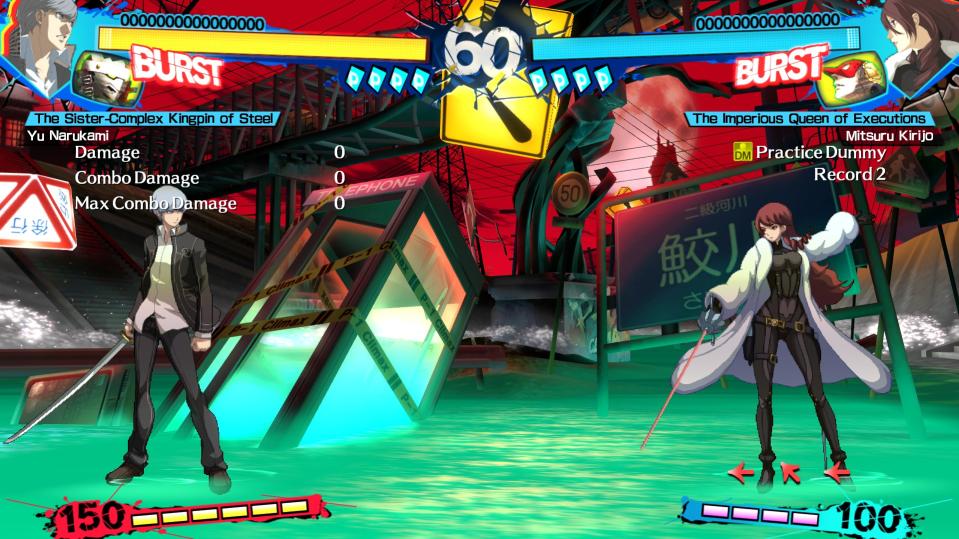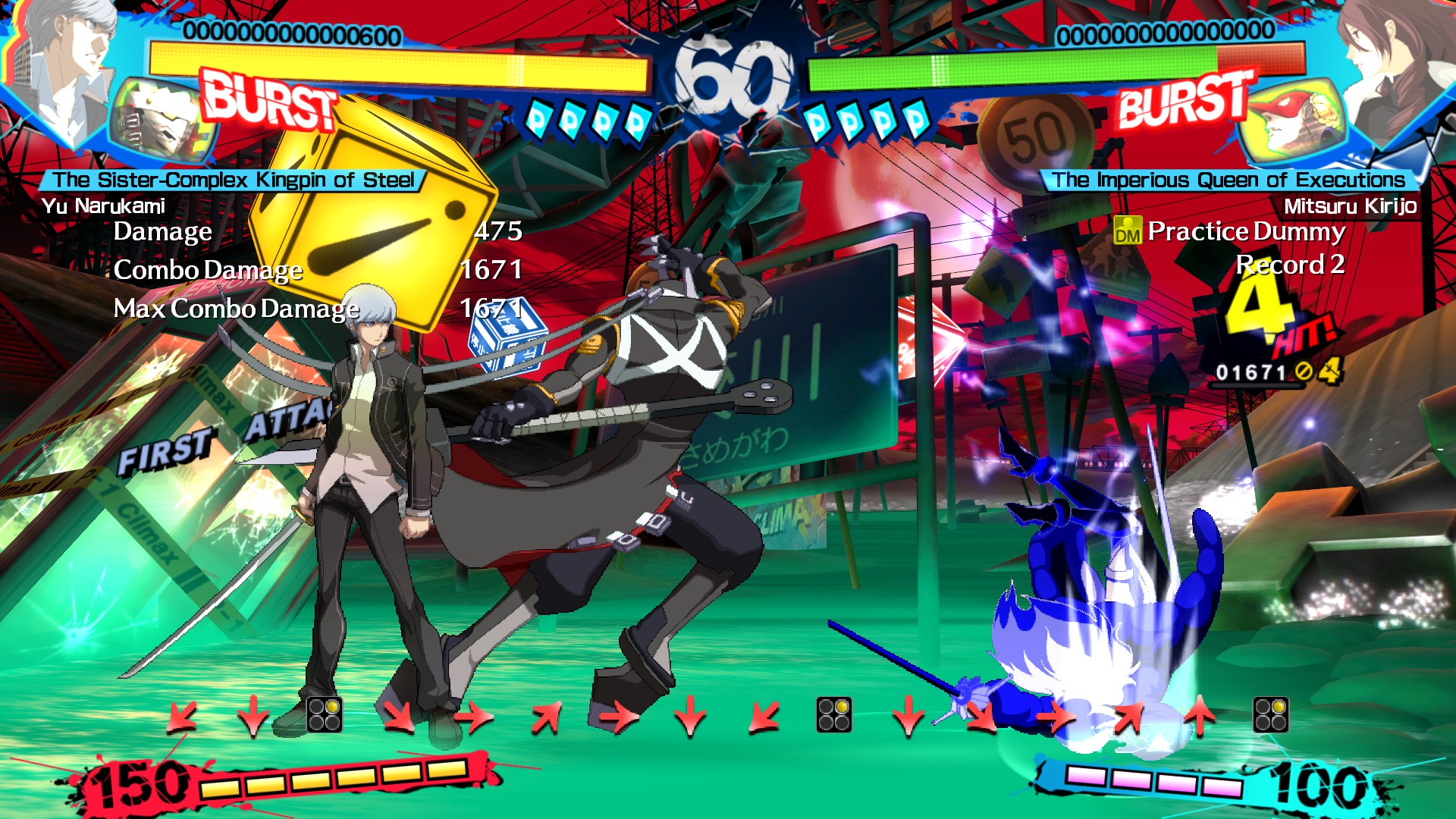Search
[{{{type}}}] {{{reason}}}
{{/data.error.root_cause}}{{{_source.title}}} {{#_source.showPrice}} {{{_source.displayPrice}}} {{/_source.showPrice}}
{{#_source.showLink}} {{/_source.showLink}} {{#_source.showDate}}{{{_source.displayDate}}}
{{/_source.showDate}}{{{_source.description}}}
{{#_source.additionalInfo}}{{#_source.additionalFields}} {{#title}} {{{label}}}: {{{title}}} {{/title}} {{/_source.additionalFields}}
{{/_source.additionalInfo}}- Details
- Category: Computer
- By Daniel Cullen
- Hits: 1612
Persona 4 Arena Ultimax (PC)

Persona 4 Arena Ultimax
Developed By: Arc System Works, ATLUS
Published By: SEGA
Released: March 16, 2022
Available On: Microsoft Windows, PS3, PS4, Switch
Genre: Fighting
ESRB Rating: Teen (Violence, Mild Blood, Suggestive Themes, Language, Use of Tobacco)
Number of Players: Singleplayer, Online PvP
Price: $29.99
(Humble Store Link)
Note: This review is based on the Steam version port, which is generally identical in features to the Switch and PS4 versions. All technical and moral scoring will be based on this version of the game, any other versions are either older in terms of content or game engine and fall out of the scope of this review. I was unable to find anyone to play against in the online mode, so all I can say is that it works, but good luck finding another player that can connect and play against you.
Fighting games based on RPGs tend to have a problem. They need to reflect the mechanics of their source but also need to be competent fighting games in their own right. Atlus knew Arc System Works had more experience in making fighting games, so they lent the Persona 4 IP to Arc to meet this requirement. Persona 4 Arena Ultimax is the result and a more than worthy one.
A bit of background, first. Persona 4 Arena Ultimax is the final version of what began as Persona 4 Arena, an arcade game that followed up on the events of Persona 4 Arena: Ultimax
The story is set a few months after Persona 4, which itself takes place a few years after Persona 3. The original Arena story focuses on the new character of Labrys from Persona 3 and a mysterious tournament that both Persona 3 and 4 characters are brought into via a "General Teddie", who is similar in appearance to the original Teddie from Persona 4 but a different person entirely.
Ultimax is the sequel story, set after Arena, with Persona 3 and Persona 4 sides. Set a short while after the conclusion of the Arena story, the casts of both Personas are drawn again into the same battle tournament as before, only they learn the stakes are much higher than before, and their loss could spell the doom of all mankind. Unlike the last time, they also discover many other remnants of the past believed dead or stopped as threats like certain villains from Persona 3 and Persona 4 have returned. Each plays a critical part in explaining why the events of both Arena and Ultimax have unfolded and why they intertwine with the casts of the two games.
Aside from the main plot of Arena and the sequel story, they have arcade modes with their own non-canon endings. Overall, both the canon story and the arcade mode use the same basic game engine and mechanics of a fighting game. The player must take control of any Persona 3 or 4 character they wish in the arcade (the story will require the usage of specific characters at different times) mode. Like most fighting games, they must defeat a series of opponents in a tiered series of matches until they beat the final opponent.

Strong Points: Good fusion of fighting game mechanics to the Persona universe
Weak Points: High learning curve
Moral Warnings: Violence in self-defense; mild blood displays; some PG-13 language (b**t**d, s***); mild sexual innuendos and some revealing/form-fitting outfits; profound display and influence of fortune telling and various mythological themes
Being a game that is a mix of the fighting game expertise of Arc System Works fused with the Persona universe of Atlus, this is a pretty "easy to learn, difficult to master" title. Each character has their own highly unique move sets (excluding the Shadow versions of the same that use the same moves with a different look from their original). The titular Persona, or a fantasy being based on the aspects of the personality given mortal form, also plays a key role in battles, providing enhanced power to attacks and special abilities only usable while they are present. While most of the game is typical of the fighting game genre, including punches, kicks, guarding, parrying, and other moves typical of hand-to-hand combat, each character has access to some form of magical talent thanks to the Personas mentioned prior. Certain attacks by opponents can deny the use of a Persona for some time by inducing a "Persona Break" denying the affected use of certain abilities and enhancement to their attacks. A key strategic element of most fights is to avoid this condition while inflicting it on the foe as early as possible. Alternatively, take out the enemy before they get much use of their own Persona first. Again, I want to emphasize, especially given this is a game made by Arc System Works, that this game has a very high learning curve. Every character feels unique, complete with their own unique timings to their movements and different frames and hitboxes for their attacks. Many also have unique gimmicks, such as Naoto having a six-cylinder revolver meter for their service weapon whose use and reloading are an important part of their battle mechanics. I strongly encourage trying each character out in the provided tutorial and practice modes to get a feel for them before playing any of the story or arcade modes. If you do, you will certainly have more fun long-term, learning as you go is not that easy. Graphically, this game uses a high-resolution, hand-drawn pixel anime art style, which remains rather faithful to their source games. The story is portrayed in brief animated clips or via anime art stills drawn from the Persona games. One interesting quirk of the art style is a lot of harsh black edges on the animated characters and animated effects, which lends well to the whole "intense action" feel the more action-based combat wants to convey compared to the source games, which were turn-based RPGs. The sounds and music are nigh entirely directly lifted from Persona 3 and 4, as is the voice acting, reprising all the original actors (Igor is voiced by Junpei's VA in some scenes in the English dub for some reason, doing a passable job). There is an English and Japanese dub, both of which are quite competent. The music of Persona 3 and 4 tended towards synth, pop, a bit of jazz, some techno, and some gothic choir at times. Ultimax features a lot of rock and electric guitar remixes of many of these tunes, fitting the fighting game tempo nicely. The game is controllable by keyboard and mouse or by any Steam-compatible gamepad. A gamepad is strongly preferred over the former, as I found keyboard controls to be quite aggravating, as the game was intended for a gamepad.I did not have a fight stick to test with, so I cannot answer if this is supported.

Higher is better
(10/10 is perfect)
Game Score - 88%
Gameplay - 17/20
Graphics - 8/10
Sound - 9/10
Stability - 5/5
Controls - 5/5
Morality Score - 52%
Violence - 5/10
Language - 6/10
Sexual Content - 5/10
Occult/Supernatural - 0/10
Cultural/Moral/Ethical - 10/10
Stability is excellent on Windows. The online feature is functional but I found the lobbies to be a ghost town, so I cannot say how well they work in finding someone to play. This is playable on Linux with some tweaks to the resolution and using Experimental/Custom Proton. Steam Deck capability is unknown at this time, though it may run with similar tweaks. Morally, there are some concerns. Also, note the game has "Shadow" versions of certain characters. These Shadow counterparts are based on the more depraved and shameful aspects of one's personality (albeit exaggerated and distorted), specific moral content relating to each will be noted. Violence is of the fighting game variety, using a variety of weapons and bare-handed moves along with magical attacks. While the violence in the fights themselves is not deadly (despite some attacks looking quite lethal), the animated cutscenes do have some mild displays of blood, and some people are clearly shown dying, albeit minus explicit details. Given the context of the story, the violence takes place within the bounds of self-defense, as they are forced to fight in a fighting tournament by the villain for their survival. Language is somewhat earthy. While certain words are censored, there are clear and somewhat frequent uses of most PG-13-level cursing such as b**t**d, b***h, a**, and s**t. Some sexual innuendos are also present, particularly from Shadow Rise (who acts as a figurative and literal whore, for attention and otherwise) and Shadow Kanji (who acts like a gay stereotype, based on the original Kanji's fears of being perceived as unmanly). Actual sexual content is limited to some character outfits, which include bikinis. Shadow Rise (based on Rise's fears she comes off as a woman of loose morals) makes some comments implying she will do some rather adult things, but this never goes past innuendoes. Shadow Kanji acts like a total gay stereotype, but aside from comments to this effect, this is also never followed up on. There is a profound supernatural influence in the game. The source canon has most of the cast draw their power from Personas, aspects of the self given corporeal form, resembling demons (in the original Greek sense of the term), particularly from Japanese, Greek, and Roman myth. Some actual beings from the same also confirmably exist, serving either good or evil purposes. Persona also has a tarot card motif, as it's used to determine the type and power of Persona a character can use. Morally and ethically, the story mode and all canonical content have the protagonists of Persona 3 and 4 trying to stop a world-ending threat. They either operate with official government sanction or are the only ones with the power to save innocent lives when other mortal authorities are powerless to do so. Aside from General Teddie having a cartoonish-looking cigar in his mouth for comedic effect, there are little to no displays of smoking or other vices. Overall, Persona 4 Arena Ultimax is not a game for fighting game casuals, but Arc Systems veterans and Persona fans will certainly enjoy it. Technically, it's quite sound. Morally, it has some concerning themes not fit for anyone who is at least not an older teenager. I recommend getting it on sale and/or if you want to round out your Persona game collection.






